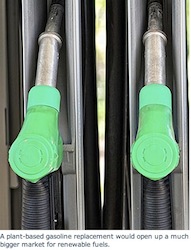A new process developed by researchers at the University of California, Davis (UC Davis) could better produce “biogasoline” from cellulosic materials. This new process of converting cellulosic materials such as farm and forestry waste, could open up new markets for plant-based fuels beyond existing diesel substitutes.
“What’s exciting is that there are lots of processes to make linear hydrocarbons, but until now nobody has been able to make branched hydrocarbons with volatility in the gasoline range,” said Mark Mascal, professor of chemistry at UC Davis and lead author on the paper published Jan. 29 in the journal Angewandte Chemie. UC Davis has filed provisional patents on the process.
 Traditional diesel fuel is made up of long, straight chains of carbon atoms, while the molecules that make up gasoline are branched and shorter. That means gasoline and diesel evaporate at different temperatures and pressures, reflected in the different design of diesel and gasoline engines.
Traditional diesel fuel is made up of long, straight chains of carbon atoms, while the molecules that make up gasoline are branched and shorter. That means gasoline and diesel evaporate at different temperatures and pressures, reflected in the different design of diesel and gasoline engines.
Biodiesel, refined from plant-based oils, is already commercially available to run modified diesel engines. A plant-based gasoline replacement would open up a much bigger market for renewable fuels.
The feedstock for the new process is levulinic acid, which can be produced by chemical processing of materials such as straw, corn stalks or even municipal green waste. It’s a cheap and practical starting point that can be produced from raw biomass with high yield, Mascal said.
“Essentially it could be any cellulosic material,” Mascal added. Because the process does not rely on fermentation, the cellulose does not have to be converted to sugars first.

